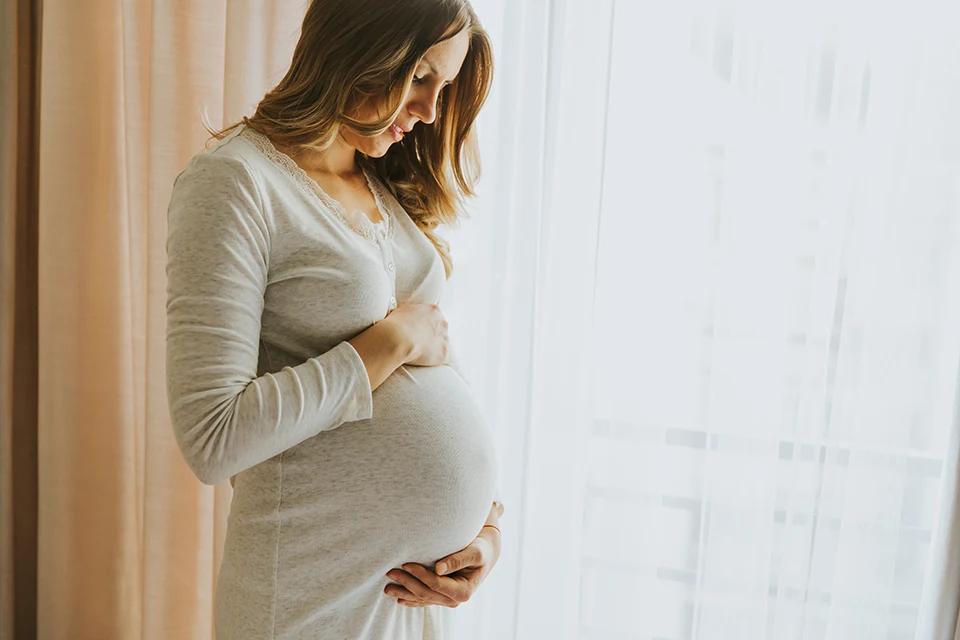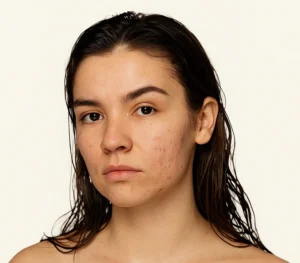Pregnancy comes with a lot of surprises—glowing skin for some, and frustrating breakouts for others. If you were hoping for that famous “pregnancy glow” and got acne instead, you’re not alone. Hormonal fluctuations during pregnancy can turn your skin care routine upside down, and suddenly you’re Googling, “Is salicylic acid safe when pregnant?” at 2 a.m.
Let’s take the confusion out of pregnancy-safe skincare. We’re breaking down everything you need to know about managing acne during pregnancy—what causes it, what’s safe to use, and how to keep your skin (and your baby!) healthy.
What Causes Pregnancy Acne?
Blame it on the hormones—specifically, androgens. During pregnancy, your body produces more of these hormones, which ramp up sebum (oil) production. That extra oil, combined with dead skin cells, clogs pores and creates the perfect breeding ground for acne-causing bacteria like Cutibacterium acnes.
You might notice:
- Whiteheads and blackheads around your chin, jawline, or cheeks
- Inflammatory papules or cystic breakouts
- More oiliness than usual, especially in the first and second trimesters
The Challenge: Treating Acne While Pregnant
Here’s the tricky part: Many effective acne treatments are off-limits during pregnancy. Ingredients like retinoids and oral antibiotics (like tetracycline) are either risky or completely unsafe. So how do you treat acne without putting your baby at risk?
Don’t worry—we’ve got safe, dermatologist-approved options (and some amazing product picks) coming up.
Ingredients to Avoid During Pregnancy
🛑 Not safe for use while pregnant:
- Retinoids (retinol, tretinoin, adapalene): Can cause birth defects.
- Salicylic Acid (in high concentrations): Low-dose spot treatments are generally okay, but avoid leave-on or oral forms.
- Benzoyl Peroxide (in high concentrations): Some dermatologists say it’s safe in moderation; others recommend avoiding it completely—always check with your doctor.
- Hydroquinone: High absorption rate and no solid safety data.
- Oral antibiotics (tetracycline, doxycycline): Linked to bone and tooth issues in developing babies.
Pregnancy-Safe Acne Treatments That Work
✅ These are generally considered safe to use:
- Azelaic Acid – Anti-inflammatory, reduces redness, and helps fade dark spots.
- Niacinamide – A multitasker that calms inflammation, supports the skin barrier, and even controls oil.
- Sulfur – Great for spot-treating stubborn pimples and reducing oil.
- Topical Clindamycin (with doctor’s guidance) – A prescription antibiotic sometimes used for moderate breakouts.
- Gentle Cleansers – Think fragrance-free, low-foaming options that won’t strip your skin.
- Moisturizers with Ceramides or Glycerin – Hydration helps balance oil production.
Always talk to your OB-GYN or dermatologist before adding anything new to your routine.
How to Build a Pregnancy-Safe Skincare Routine
Your skin doesn’t need a 10-step routine right now. In fact, simplicity is key—especially when hormones are running the show. Here’s how to build a gentle, effective routine that supports your skin through all three trimesters:
🧼 Step 1: Cleanse (Gently!)
Use a fragrance-free, non-stripping cleanser morning and night. Look for formulas with ingredients like glycerin, ceramides, or niacinamide.
Try:
💧 Step 2: Treat with Safe Actives
This is where your acne-fighting ingredients come in—but make sure they’re pregnancy-safe.
- Morning: Apply a serum with niacinamide (brightens, calms redness, regulates oil)
- Evening: Use azelaic acid or a sulfur spot treatment if needed
Try:
- The Ordinary Niacinamide 10% + Zinc 1%
- Paula’s Choice 10% Azelaic Acid Booster
- Kate Somerville EradiKate Spot Treatment (Sulfur)
🧴 Step 3: Moisturize
Yes, even if you’re breaking out. A lightweight, non-comedogenic moisturizer keeps your barrier healthy and helps prevent overproduction of oil.
Try:
☀️ Step 4: SPF Every. Single. Day.
Hormonal pigmentation (aka melasma) is common during pregnancy. A broad-spectrum SPF protects against UV damage and dark spots.
Try:
What If Nothing Seems to Work?
If your breakouts are severe, painful, or affecting your mental health, it’s 100% okay to ask for help. A board-certified dermatologist can work with your OB to find safe prescription options. You don’t have to just “wait it out.”
FAQs: Acne and Pregnancy
Can pregnancy cause acne even if I’ve never had it before?
Yes! Hormones are the main culprit, and even if your skin was clear before, you might develop acne during the first or second trimester.
Can I get facials or chemical peels?
Stick to gentle, hydrating facials—skip anything with strong acids, retinoids, or intense exfoliation. Always let your esthetician know you’re pregnant.
Will my acne go away after birth?
For many people, pregnancy acne improves postpartum as hormones normalize. But if you’re breastfeeding, you’ll still want to stick with baby-safe skincare.
AcneAdvocate is a participant in the Amazon affiliate advertising program and this post may contain affiliate links, which means we may earn a commission or fees if you make a purchase via those links.





